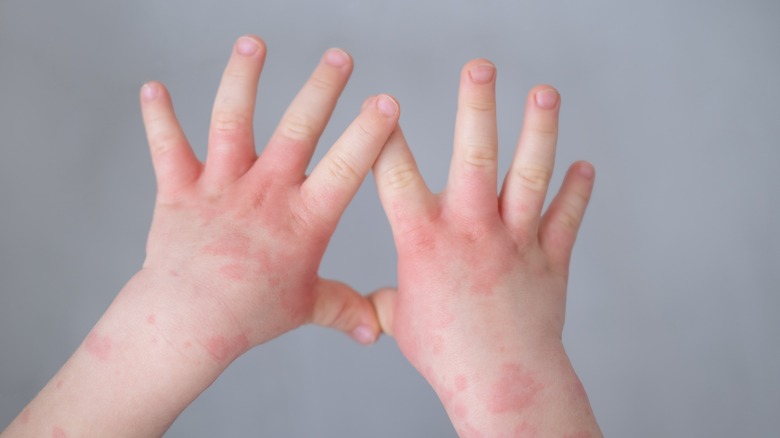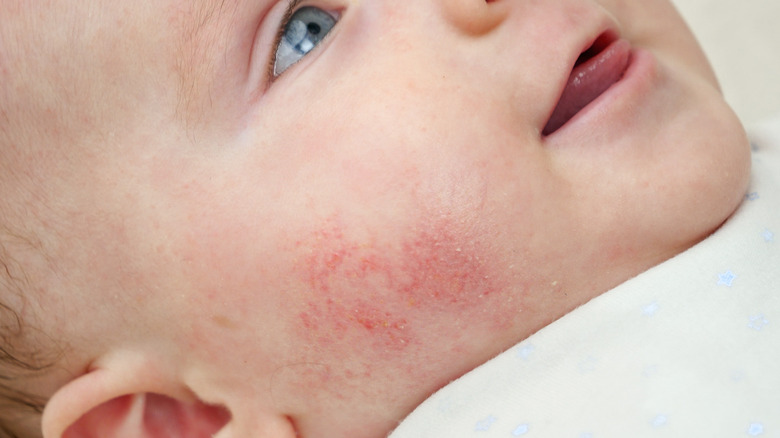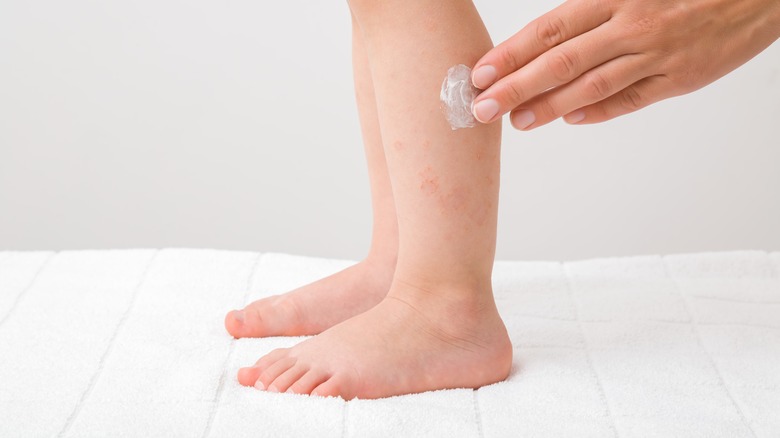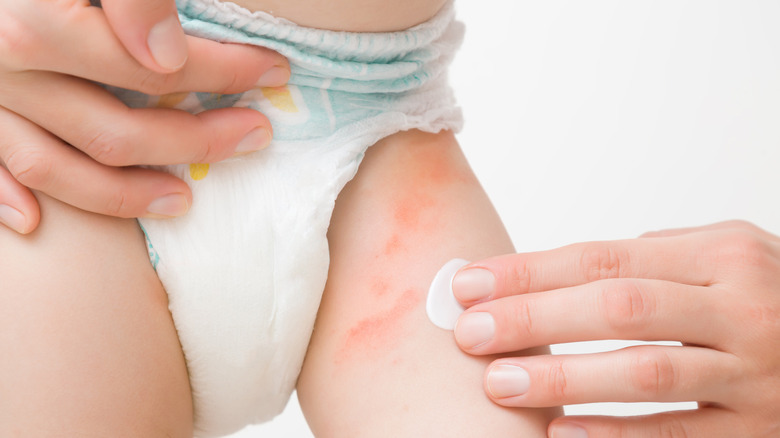What Parents Should Know About Eczema In Babies
Eczema is a condition that causes dry and itchy skin, which typically affects babies. Estimates from the American Academy of Dermatology Association show that eczema affects up to 25% of children, and up to 60% of people with the condition develop it during the first year of life.
This benign condition can be frustrating and uncomfortable for babies and toddlers partially because their skin is thinner, more sensitive, and fragile (via The Royal Children's Hospital Melbourne). According to the source, the skin of newborns is less resistant to bacteria and other harmful allergens that can cause irritation to the skin after penetrating it.
According to Healthline, baby eczema often appears on the neck, eyelids, or around the mouth. In some cases, it might appear on the creases of the elbows, wrists, ankles, and the back of the knees.
According to the American Academy of Dermatology Association, there's no cure for this condition. A huge part of managing the symptoms depends on the carer's knowledge of the condition. Given this, here are a few things parents should know about eczema in babies.
Baby eczema has various causes
Various genetic and environmental factors could be at play if your baby's skin develops eczema.
First, eczema can occur in toddlers due to an immune system reaction. According to the Cleveland Clinic, babies can get eczema after exposure to certain fabrics or soaps that contain irritants or allergens. This can cause the immune system to react and attack healthy skin cells. Since the skin contains various cells like ceramides which protect it from external factors, an eczema flare-up can also happen if a baby's skin doesn't make enough of these cells, reveals WebMD. The skin eventually loses water and dries up.
Beyond the immune, a genetic mutation can also cause eczema, which might indicate that the protective barriers in the skin aren't functioning as expected, per the clinic.
Even though the severity of eczema varies from one baby to another, the skin condition can become critical if your baby has dry skin. Severe eczema might also respond to stress, heat, and sweat.
Besides genetics and environmental factors, other unknown causes may exist. According to MedicalNewsToday, more research along this line is being done, especially regarding how the skin's microbiome and other external factors like viruses and bacteria cause or relieve eczema in babies.
The right skincare regimen is vital
Apart from maintaining the integrity of your baby's skin barrier, adopting the right skincare regimen can help prevent skin conditions like eczema as your baby grows. Your baby's skin in the first few months of life may seem thinner and more sensitive because it's still developing. Often, this makes them prone to eczema flare-ups caused by irritants or allergens. Given this, the right skincare regimen is vital.
According to the Cleveland Clinic, moisturizing your baby's skin daily can help keep eczema at bay. However, it's crucial to double-check if the ingredients in your chosen products contain fragrance. According to the clinic, fragrance-free products are better for babies
Caring for your baby's skin goes beyond products — how you bathe your child also matters. WebMD recommends using lukewarm water, which can cool and hydrate the skin. The source also advocates for shorter bath times, spanning 10 minutes. Once bathed, pat your baby's skin dry with a clean towel instead of rubbing it.
According to The Royal Children's Hospital Melbourne, adopting a healthy skin regimen through appropriate cleansing, sun protection, and moisturizing can significantly impact a baby's health.
Topical corticosteroids are also available
According to a 2022 study published in the Cochrane Database of Systematic Reviews, topical corticosteroids have been the first-line treatment for eczema since they were first introduced in the 1950s. Topical steroids are applied via semi-occlusive petroleum-based ointments, creams, and lotions that lubricate the skin and prevent it from water or moisture loss (via American Osteopathic College of Dermatology). According to the college, they're effective due to their anti-inflammatory properties. Although the inherent potency and the ability of the product to penetrate the skin may influence its effectiveness, topical steroids can still help manage eczema symptoms.
Besides knowing how corticosteroids work, it's crucial to understand how to apply them to your baby's skin in order to optimize their effects and reduce the risk of side effects. The Cleveland Clinic recommends applying 1% ointment twice daily for no longer than two weeks if your baby's eczema is mild. If your baby's eczema symptoms are severe, it's best to consult your doctor instead of applying a stronger steroid ointment (which might cause discoloration or further thin out your baby's skin).
Other conditions can mimic baby eczema
Since eczema causes dry, itchy skin in babies, you might confuse the skin rashes with other conditions like cradle cap (infant seborrheic dermatitis), which is less irritating and itchy (via WebMD). Cradle cap often appears on the scalp, eyelids, and eyebrows, while baby eczema usually affects the cheeks, arms, and leg joints. According to MedicalNewsToday, it's much milder than baby eczema and often comes with thicker, shinier patches of scaly skin than the dry ones that usually appear with eczema.
Other skin conditions like psoriasis can also mimic the symptoms of baby eczema, even though infant cases of psoriasis are rare. The condition often appears in the baby's diaper area and comes with nail pits and small depressions in the toe and fingernails, says MedicalNewsToday.
Finally, a type of fungal infection called ringworm can appear similar to eczema. Its main symptom is a rash with a red, raised border that may appear on the scalp, forehead, or anywhere else on the body. The rash may be itchy and scaly in appearance. Babies might experience small patches of hair loss. The patches can appear pink or red on lighter skin and brown or gray on darker skin.
Adopting the correct feeding method can help
While allergies do not cause eczema, baby eczema symptoms can be triggered by a food allergy (per Australasian Society of Clinical Immunology and Allergy). Common food allergies include milk, wheat, peanuts, eggs, fish, soy, and tree nuts like almonds or walnuts (via WebMD).
Besides understanding the primary sources of food allergies, a carer's approach to feeding may increase or decrease the risk of baby allergies which in turn could prevent these from becoming an eczema trigger. Carers need to understand the proper methods of feeding their children. According to the Australasian Society of Clinical Immunology and Allergy, introducing solid allergy-causing foods to babies by the age of 12 months may help reduce the chances of food allergies.
The good news is that some foods might be beneficial for babies with eczema and might help protect their skin against inflammation, oxidative stress, and cell damage. According to a 2016 study published in the journal Oxidative Medicine and Cellular Longevity, fruits and vegetables are rich in antioxidants which can help fight against inflammation. Fermented foods might also be helpful since they come loaded with good bacteria. One 2017 review published in the journal Frontiers in Cellular and Infection Microbiology reveals notes of a small yet significant effect of Lactobacillus fermentum and eczema symptoms. However, the review calls for more research to prove how safe this can be for babies.






